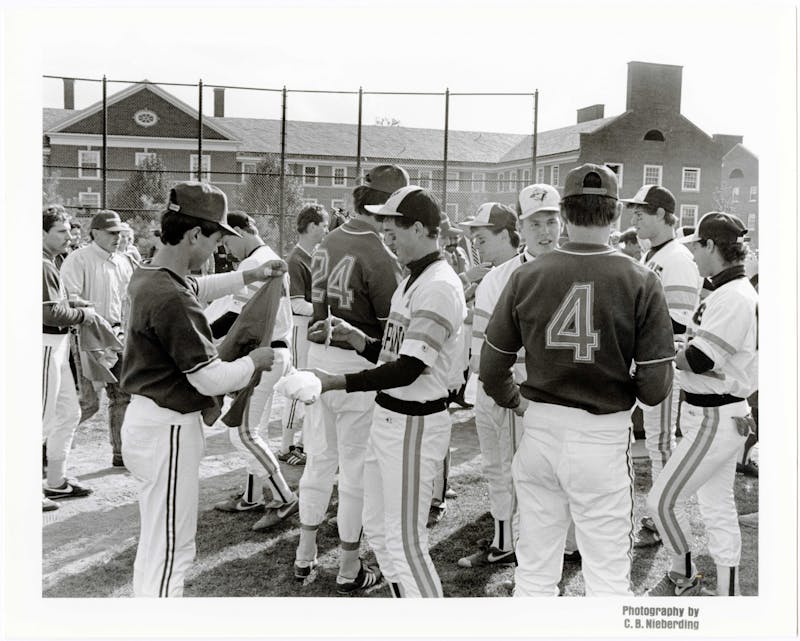
COURTESY OF THE JOHNS HOPKINS UNIVERSITY GRAPHIC AND PICTORIAL COLLECTION
Members of the baseball team exchange gifts with a visiting Soviet team in 1988, which occurred during McGuckian’s time with The News-Letter.

COURTESY OF THE JOHNS HOPKINS UNIVERSITY GRAPHIC AND PICTORIAL COLLECTION
Members of the baseball team exchange gifts with a visiting Soviet team in 1988, which occurred during McGuckian’s time with The News-Letter.
Rachel McGuckian attended Hopkins from 1986 to 1990 and was a four-year varsity letter winner in field hockey, and an All-University Athletic Association selection and co-captain her senior year. There was a dearth of writers interested in reporting on women’s sports in the 1980s, and during her freshman year she occasionally wrote articles for The News-Letter at the request of either staff, coaches or the athletic department. She was invited to become a regular staff writer her sophomore year, and was named Co-Sports Editor (along with Josh Orenstein) her senior year. She was one of the first female Sports Editors in Hopkins history.
After graduating with a Political Science degree and a minor in History of Art, she attended the University of Baltimore School of Law, clerked for a federal judge and entered private practice. She is a senior partner and litigator with Miles & Stockbridge and an adjunct law professor, and she is the proud mother of two college girls. She enjoys returning to Hopkins to play in the alumni field hockey game or watch lacrosse.
The News-Letter: Why did you first decide to write articles for The News-Letter? How did you get involved ?
Rachel McGuckian: I think it was because I thought there wasn't enough coverage of women's sports. I wanted to be able to expand the types of articles about women's sports instead of just having a box that says who scored what. [Something that] was more detailed and got more information about what actually happened in the games and who the players were, where they came from. More putting a face on the women's sports.
N-L: You were one of the first female Sports Editors at The News-Letter. How important do you think it was for you to have that position? And what kind of impact do you think that that has had since then?
RM: I think it's really important because whether you just sit on the board of directors or in management of a company, diversity of perspective is really important. So I think it's very important to have more people from different backgrounds, different genders, people of color, all coming to look at an issue differently. I think looking back that having a woman looking at sports highlighted women in the section. It made the sports page better if there was a female editor at the time. And again, everything's better when you have more diversity of perspective. But I'm very proud that I was one of the first female Sports Editors. I'm glad there are fewer and fewer firsts, because hopefully gender will be normalized in every position at some point.
N-L: Do you have any funny personal stories or any memorable moments?
RM: My funniest memory is just how I went from starving because there was no pizza left down in the bottom dungeon of that place to figuring out the strategy for getting pizza. And so ultimately settling on the anchovy strategy was very successful. So that's kind of my funny one.
N-L: How do you remember the sort of culture and community of The News-Letter back then?
RM: It was always just freewheeling and collaborative and funny. They're really smart people that write and put out The News-Letter. Totally dedicated to their cause. Everybody was there to support each other. There was no competition within the newsroom or any other part. It was just a lot of people who are believers in getting information out to most of the student body in the best way they knew how.
N-L: And how did your time at The News-Letter help you prepare for your career after college?
RM: I went to law school right after college. And I think writing for The News-Letter and especially editing made me a better writer. I write very concisely now. I learned from people there who are better writers than I am, and I'm always willing to learn from somebody. So it impacted my career to the extent that I'm considered a very good legal writer. And I think part of that is learning how to write so that people will listen. And I got that from The News-Letter more than any class.
N-L: Is there anything you’d like to add?
RM: The News-Letter is a Hopkins treasure and it has been forever, and the people that have written over those 125 years are very impressive people in the history of this country. And they've made a difference when they were there and they made a difference after. I'm very honored to be a part of the Hopkins News-Letter alumni.